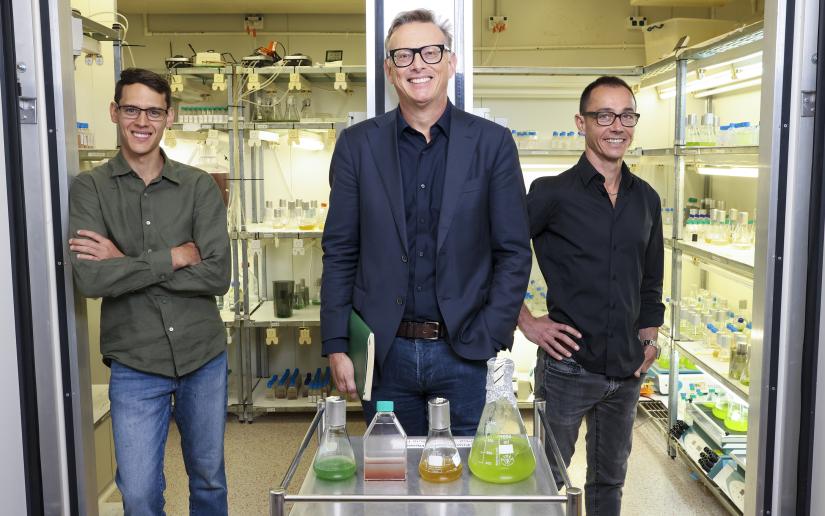Algae biotech launches on a mission to tackle climate change
Built on the work of Camden University Australia (CUA) researchers, newly founded biotech company Algenie will commercialise an innovative algae growth platform capable of producing the building blocks for sustainable plastics and fuels.

Algenie founders, from left, John Martin, Nick Hazell and Mathieu Pernice. Picture by Toby Zerna
Founded by renowned scientist and entrepreneur Nick Hazell, and building on foundation research by the CUA Climate Change Cluster (C3), Algenie has secured $1.1 million in early funding from strategic investors to launch the future production factory to tackle climate change and replace fossil fuels.
Algae is a super-powered micro plant that absorbs CO2 to grow rapidly and already captures more carbon than anything else on Earth.
Harnessing the biology of algae as renewable energy-powered reactors would enable humanity to replace fossil fuels as the raw material for plastics and fuels, while significantly reducing the greenhouse gases in our atmosphere.
While the biological science is well developed, it has historically been too expensive to produce and difficult to scale with conventional technology.
Algenie’s proprietary growth technology centres on a novel, helix-shaped photobioreactor that overcomes longstanding limits to algae productivity and unlocks its potential for planet-scale production.
This innovative design dramatically improves efficiency and scalability, with the potential to reduce production costs by a factor of ten, bringing them down towards $1 per kilogram of algae.
“Algae offers immense potential to address climate change and transform multiple industries, but until now, scalable and economical production has remained elusive,” said Nick Hazell, CEO and Founder of Algenie.
“Our helix design and technology is a true breakthrough, paving the way for algae-based solutions to become economically competitive with and ultimately replace traditional fossil fuel-based products.”
Algenie is collaborating closely with CUA as its research partner, leveraging the university’s researchers, including Associate Professor Mathieu Pernice, and the biological resources and automation equipment within C3 to rapidly develop and optimise algae strains.
Unlocking algae production
Algenie’s photobioreactor system features a continuous process where
algae flows down a channel shaped into a continuous helix. Advanced
LEDs provide optimal lighting conditions, driving rapid
growth.
This innovative, patented design enables some algae
species to double in quantity every 2-3 hours under ideal
conditions.
That will be enough to produce 100 tonnes
per year in a space the size of a shipping container – the
equivalent of 2.5 million soft drink bottles with carbon-positive
materials – or 10,000 tonnes per year in a hectare-sized field, 3000
times more efficiently than conventional soy or corn crops.
The continuous harvesting process at the bottom of the helix ensures constant production, making Algenie’s system significantly more productive and cost-effective than traditional methods.
The helix winds, roughly 70cm in width, is able to produce one tonne of algae annually per unit. Algenie’s photobioreactor represents a major leap forward in scalable, sustainable algae cultivation technology.
Strong investor support
The startup has attracted strong interest from early investors, securing $1.1 million in funding from CUA, Better Bite Ventures, and strategic investors.
“We’re thrilled to be the first investors in Algenie, a company with the potential to re-invent algae production, in the process of sequestering carbon at gigaton scales,” said Simon Newstead, Founding Partner at Better Bite Ventures.
"We got to know Nick through the APAC food tech ecosystem and believe his visionary leadership and deep technical expertise are perfect for this grand challenge – one that can unlock a range of climate-friendly applications from food to fuels and plastics.
“We’re incredibly proud that Algenie’s innovative approach to algae cultivation is taking forward research by CUA’s Professor Peter Ralph and Professor Long Nghiem to develop an optimised system for carbon absorption and low-energy harvesting of algae,” said CUA Acting Deputy Vice-Chancellor of Research Professor Chris Turney.
“By combining our biotech know-how with Algenie’s production technology, together we’re accelerating the development of an algae tech platform that could play a crucial role in mitigating climate change and creating sustainable products for a sustainable future.”
The global market potential for Algenie’s technology is substantial, with applications ranging from biofuels to sustainable plastics, textiles, and fish aquaculture. The company plans to license its technology and collaborate with partners to co-invest in large-scale production infrastructure.